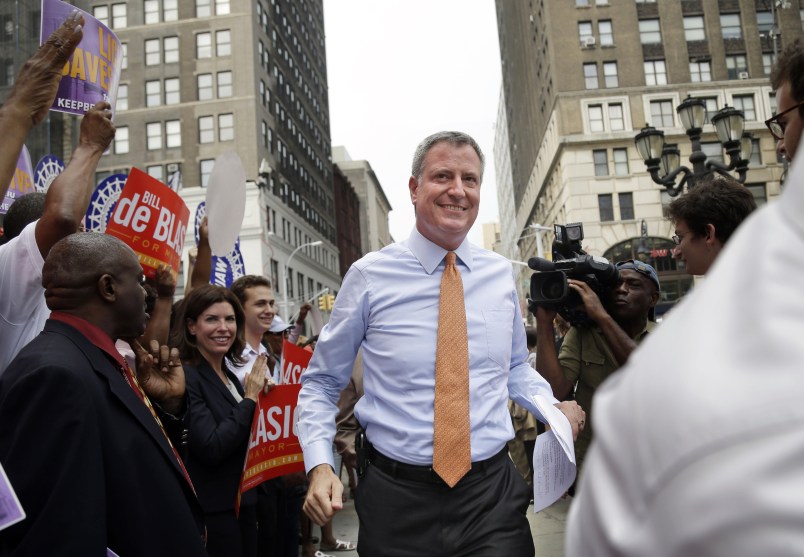Andrea Elliott’s masterpiece project in the New York Times documenting the tribulations of a loveable Brooklyn girl named Dasani through the unforgiving maze of social services in New York City became an instant classic. With each word in the five-part series, Elliott unmasks the countless rips in the fabric of our social safety net.
As I read through the gripping ordeal that shines a light on the corners of our society so often left in the dark, I imagined the article forming a giant exclamation mark on what’s undoubtedly been the year of exposing inequality.
This year New York City voters elected a mayor who rode an unapologetically populist message to Gracie Mansion. Back in January, Bill de Blasio was mired in poll numbers that would make the New York Knicks’ record seem hopeful. To put it bluntly: de Blasio had seemingly no path to victory. Or so it seemed — until his message started to resonate. By aggressively and plainly talking about rising inequality and the marginalization of working people, de Blasio didn’t just capture attention, he captured votes.
After winning the Democratic Primary by a narrow margin, de Blasio never looked back and easily swept the general elections. In a telling tale of the times, de Blasio brought his progressive rhetoric and sharp focus on economic inequality to the general election campaign and the voters rewarded him, electing de Blasio by a historic margin in a city that hadn’t chosen a Democratic mayor in 20 years.
The message certainly resonated down the I-95 corridor as President Obama spoke out as strongly as ever on issues affecting low-income Americans, declaring the widening gulf between the rich and poor to be the “defining challenge of our time.”
Imagine such bold language just a few years ago from a president who was on the defensive when labeled by Tea Party fanatics as a Marxist who wanted to redistribute wealth while running around forging birth certificates.
Likewise, liberal darling Sen. Elizabeth Warren (D-MA) didn’t back down from pro-worker ideas that helped her win back Ted Kennedy’s seat from Republican Scott Brown. Despite her status as a freshman member in a club that asks rookies to sit in the back and quietly bide their time, Warren pushed aggressively for strengthening Social Security benefits for retirees at a time when fiscal hawks want to weaken the safety net as a means to reducing long-term deficits. Thanks to efforts by her and other progressive senators, any chipping away at entitlement programs became a nonstarter in budget negotiations during the shutdown.
From politics to pews, in 2013 talk of economic inequality found friends in high places. Pope Francis singled out “trickle-down” economics amidst a blistering critique of unfettered capitalism. The pope took the fight to conservative theories in what would be seen as a historic decree, challenging society’s obsession with stock markets and antipathy towards the plight of the poor.
While none of us saw His Holiness camped out at Zuccotti Park, there is little doubt that the wave of populism which reached its zenith in 2013 was sparked by the Occupy Movement. Though imperfect in many ways, Occupy Wall Street activists and their supporters struck the economic status-quo like a lightning bolt, planting the “99 percent” in our vernacular and uncloaking the systemic imbalances that harm the working class.
Of course, we’ve hardly made a dent in the nuts and bolts that drive the engine of inequality. The devastating impact of deregulating big banks, off-shoring middle-class jobs and waging wars the world over still wreaks havoc on working-class families.
But while some people in government are talking about inequality, members of Congress are still not doing enough. Congress continues to fail at advancing basic measures like an extension of unemployment benefits that have historically proven to be a cost effective way to safeguard out-of-work Americans while putting money back into the economy. Cuts to food stamps are forcing those in poverty to make impossible choices. The gaping gap between the very rich and everyone else continues to widen and minimum wage jobs force even those working full-time to live in poverty that is bruising and, too often, permanent.
Even the most optimistic among us won’t pretend that growing rhetoric is a substitute for real, meaningful action that attacks the pillars of inequality.
But 2013 was critical in that injustices inherent to economic inequality were called out more forcefully than at any time in recent memory. As we have learned over and over throughout history, exposing injustice is always the first (and necessary) step in ending injustice.
Perhaps 2013 is the turning point we were looking for.
Ibrahim Khan is a political/communications consultant at the MirRam Group, a New York City-based consulting firm.






